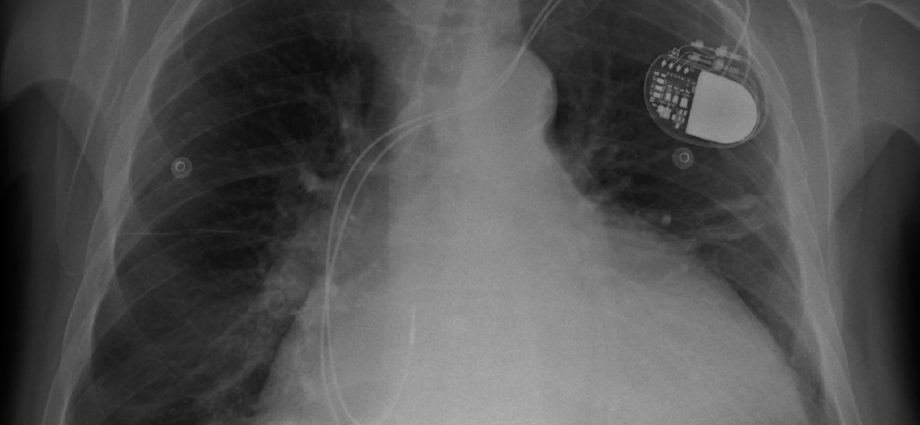Contents
Cardiomegalie
Cardiomegaly, or cardiac hypertrophy, refers to the pathological increase in the size of the heart. Sometimes cardiomegaly has no symptoms. On the other hand, when the heart can no longer perform its pumping job, heart failure develops. Cardiomegaly can develop at any age, especially in adolescence and early adulthood. Its diagnosis is mainly based on chest x-rays and cardiac ultrasound.
What is cardiomegaly?
Definition of cardiomegaly
Cardiomegaly, or cardiac hypertrophy, refers to the pathological increase in the size of the heart. It should not be confused with the muscular heart, therefore also more voluminous, of the regular athlete which is on the other hand a sign of good health.
Types of cardiomegaly
Among the different types of cardiomegaly, we find:
- Hypertrophic cardiomyopathy (CHM), hereditary and of genetic origin, associated with an overall enlargement of the heart due to a disease of the structure of the cardiac cell;
- Left ventricular hypertrophy (LVH), characterized by thickening of the left ventricular muscle;
- Peripartum cardiomyopathy, rare, which occurs at the end of pregnancy or in the months following childbirth.
Causes of cardiomegaly
The causes of cardiomegaly are various:
- Malfunction of the valves;
- A lack of irrigation;
- Disease of the heart or heart cells;
- The presence of an obstacle to blood ejection from the heart – high blood pressure, tight narrowing of the aortic valve;
- Pericardial effusions, due to the accumulation of fluid in the envelope of the heart.
Diagnosis of cardiomegaly
Diagnosis is based primarily on chest x-rays and cardiac ultrasound (echocardiography), a medical imaging technique that allows you to observe the entire structure of the heart.
Additional examinations can be carried out:
- An echocardiogram, using sound waves (ultrasound) to create an image of the heart, allows you to observe the shape, texture and movement of the valves, as well as the volume and function of the heart chambers;
- An electrocardiogram (ECG / EKG) allows the recording of the electrical phenomena of the living heart;
- Magnetic resonance imaging (MRI).
Hypertrophic cardiomyopathy has a genetic origin. The doctor may therefore recommend:
- A molecular genetic analysis test by blood sample;
- A family assessment.
People affected by cardiomegaly
Cardiomegaly can develop at any age, especially in adolescence and early adulthood. In addition, one to two in every thousand people are born with hypertrophic cardiomyopathy (CHM).
Factors favoring cardiomegaly
Factors favoring cardiomegaly include:
- Congenital or hereditary heart disease;
- Viral heart infections;
- Diabetes ;
- Anemia;
- Hemochromatosis, a genetic disease caused by excessive intestinal absorption of iron resulting in the deposition of this element in various organs such as the liver, heart and skin;
- Arrhythmia;
- Amyloidosis, a rare disease characterized by the presence of insoluble protein deposits in the tissues;
- Hypertension;
- Thyroid disorders;
- The pregnancy ;
- Overweight ;
- Physical inactivity ;
- Extreme stresses;
- The abuse of alcohol or drugs.
Symptoms of cardiomegaly
No symptoms
Sometimes cardiomegaly does not have any symptoms until the problem worsens. Symptoms develop when the heart can no longer perform its pumping job.
Heart failure
Cardiomegaly causes heart failure which is usually manifested by the appearance of swelling of the lower limbs – edema – and shortness of breath.
Sudden death
Cardiomegaly increases the risk of sudden death in the athlete during intense physical activity.
Other symptoms
- Pain in the chest;
- Heart palpitations: fast or irregular heartbeat;
- Dizziness;
- Loss of consciousness ;
- Early exhaustion as a result of physical activity;
- And many more
Treatments for cardiomegaly
The treatment of cardiomegaly is that of its cause and will be adapted by the doctor according to the diagnosis.
Depending on the severity of the disorders, the treatment may be medication, to allow better cardiac pumping or lower blood pressure, or surgical when the risks are high. The installation of a cardioverting defibrillator (ICD) – an implanted device to control irregular heartbeat – implantable can in particular be considered.
Prevent cardiomegaly
Some precautions will reduce the risks associated with cardiomegaly:
- Diagnose cardiomegaly in the event of intense exercise sports practice;
- No smoking ;
- Practice regular physical activity;
- Know and control your blood pressure;
- Choose a healthy diet low in fat, especially saturated and trans fat;
- Maintain a healthy weight;
- Control your diabetes;
- Limit alcohol consumption;
- Manage stress.










